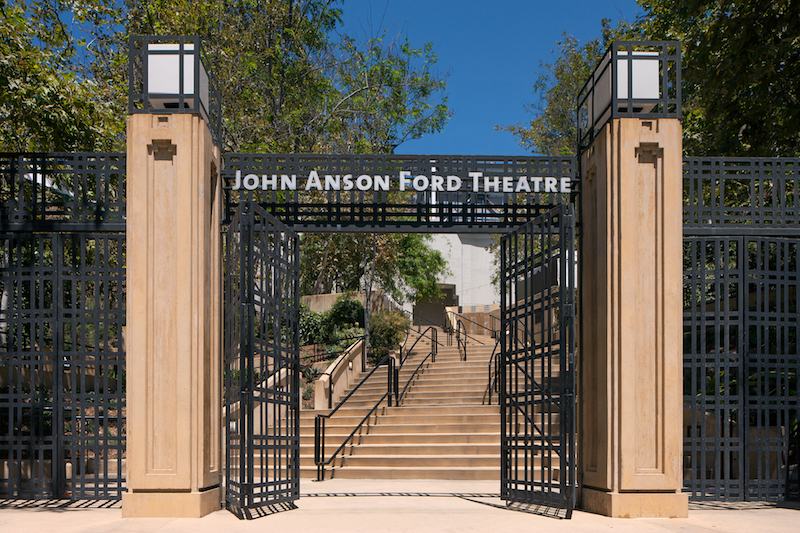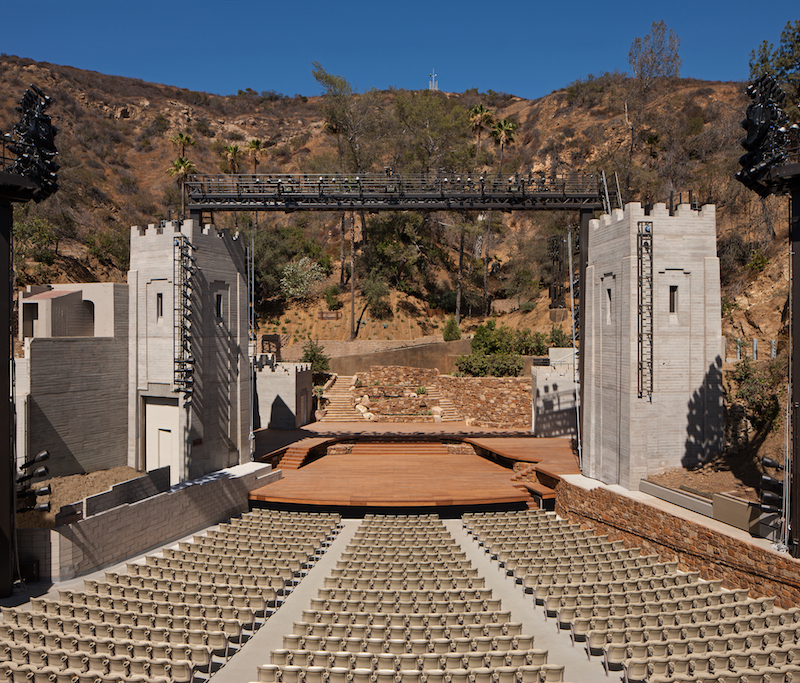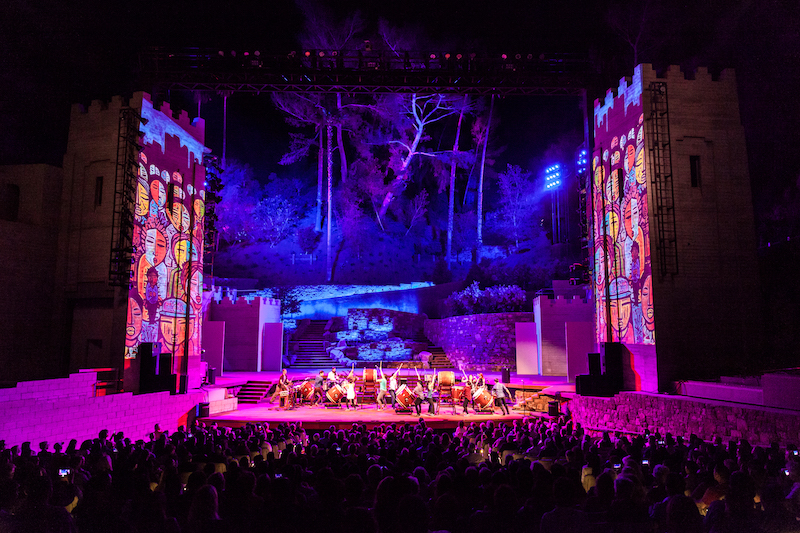On July 14, Los Angeles County will conduct a dedication and open house for its 1,200-seat John Anson Ford Theater, the 97-year-old outdoor performance center nestled in the Hollywood Hills that has received a $72.2 million facelift, which took more than four years to complete.
Two of the three construction phases for this project were completed a year ago, including the restoration of the Ford Amphitheater stage with a Brazilian walnut Ipe hardwood deck. The theater is adjacent to a 32-acre park, whose hillside sloping was stabilized with retaining walls and other erosion-control measures.
Artist support spaces have been expanded, and new theatrical and AV infrastructure was installed, including the creation of a sound wall that encompasses a projection booth and control room, catwalks, and an upgraded lighting platform. A sound barrier will help muffle vehicular noise coming from the nearby Highway 101.

The outdoor theater is located in the hills of Cahuenga Pass, surrounded by a 32-acre park whose landscaping was stabilized and upgraded as part of the renovation. Image: Tom Bonner
In addition, a new three-story structure with a full-service loading dock below and offices above was constructed. An 87-seat black box theater, [Inside] the Ford, was repurposed as a 580-sf self-serve food marketplace and community room. All told the renovation and restoration added 3,500 sf of “found space” from bedrock under the stage, and a 2,315-sq picnic terrace that can seat up to 110. (Crumble Catering is the marketplace partner.)
The John Anson Ford Amphitheater has always been a less-conspicuous, littler cousin to the more-famous, 17,500-seat Hollywood Bowl.

Among the refurbishings of John Anson Ford Amphitheater is the installation of a new Ipe hardware deck for the stage. Image: Tom Bonner
Opened in 1920, the amphitheater was designed, somewhat bizarrely, to resemble the gates of ancient Jerusalem. Christine Wetherill Stevenson, heiress to the Pittsburgh Paint fortune and a playwright, was instrumental in securing the land and building for the original theater, which staged her drama “The Pilgrimage Play.”
In 1976, the theater was renamed in honor of John Anson Ford, and L.A. County supervisor who founded the L.A. County Arts Commission. (The county owns the theater.)
The Building Team for the renovation and restoration included Levin & Associates Architects (design architect), Pankow Builders (construction services), Cumming Construction Management (project manager), Structural Focus (SE), Lucci & Associates (EE), The Sullivan Partnership (M/P engineer), Mollenhauer Group (CE, Survey), McKay Conant Hoover (acoustical and AV engineer), Wiss Janney Elstner Associates (material conservation), Mia Lehrer + Associates (landscape architect), Horton Lees Brogden (lighting design), Leighton (geotechnical), Sussman Prejza & Company (signage), and Theatre Projects (theatrical).
Related Stories
| Aug 11, 2010
Curtain rises on Broadway's first green theater
The Durst Organization and Bank of America have opened New York's first LEED-certified theater, the 1,055-seat Henry Miller's Theatre. Located inside the new 55-story Bank of America Tower at One Bryant Park, the 50,000-sf theater is located behind the preserved and restored neo-Georgian façade of the original 1918 theater.
| Aug 11, 2010
Restoration gives new life to New Formalism icon
The $30 million upgrade, restoration, and expansion of the Mark Taper Forum in Los Angeles was completed by the team of Rios Clementi Hale Studios (architect), Harley Ellis Devereaux (executive architect/MEP), KPFF (structural engineer), and Taisei Construction (GC). Work on the Welton Becket-designed 1967 complex included an overhaul of the auditorium, lighting, and acoustics.
| Aug 11, 2010
Gold Award: Eisenhower Theater, Washington, D.C.
The Eisenhower Theater in the John F. Kennedy Center for the Performing Arts in Washington, D.C., opened in 1971. By the turn of the century, after three-plus decades of heavy use, the 1,142-seat box-within-a-box playhouse on the Potomac was starting to show its age. Poor lighting and tired, worn finishes created a gloomy atmosphere.
| Aug 11, 2010
Giants 300 University Report
University construction spending is 13% higher than a year ago—mostly for residence halls and infrastructure on public campuses—and is expected to slip less than 5% over the next two years. However, the value of starts dropped about 10% in recent months and will not return to the 2007–08 peak for about two years.
| Aug 11, 2010
Bowing to Tradition
As the home to Harvard's Hasty Pudding Theatricals—the oldest theatrical company in the nation—12 Holyoke Street had its share of opening nights. In April 2002, however, the Faculty of Arts and Sciences decided the 1888 Georgian Revival building no longer met the needs of the company and hired Boston-based architect Leers Weinzapfel Associates to design a more contemporary facility.
| Aug 11, 2010
Team Tames Impossible Site
Rensselaer Polytechnic Institute, the nation's oldest technology university, has long prided itself on its state-of-the-art design and engineering curriculum. Several years ago, to call attention to its equally estimable media and performing arts programs, RPI commissioned British architect Sir Nicholas Grimshaw to design the Curtis R.
| Aug 11, 2010
Silver Award: Hanna Theatre, Cleveland, Ohio
Between February 1921 and November 1922 five theaters opened along a short stretch of Euclid Avenue in downtown Cleveland, all of them presenting silent movies, legitimate theater, and vaudeville. During the Great Depression, several of the theaters in the unofficial “Playhouse Square” converted to movie theaters, but they all fell into a death spiral after World War II.
| Aug 11, 2010
Biograph Theater
Located in Chicago's Lincoln Park neighborhood, Victory Gardens Theater Company has welcomed up-and-coming playwrights for 33 years. In 2004, the company expanded its campus with the purchase of the Biograph Theater for its new main stage. Built in 1914, the theater was one of the city's oldest remaining neighborhood movie houses, and it was part of Chicago's gangster lore: in 1934, John Dillin...
| Aug 11, 2010
Platinum Award: Reviving Oakland's Uptown Showstopper
The story of the Fox Oakland Theater is like that of so many movie palaces of the early 20th century. Built in 1928 based on a Middle Eastern-influenced design by architect Charles Peter Weeks and engineer William Peyton Day, the 3,400-seat cinema flourished until the mid-1960s, when the trend toward smaller multiplex theaters took its toll on the Fox Oakland.







